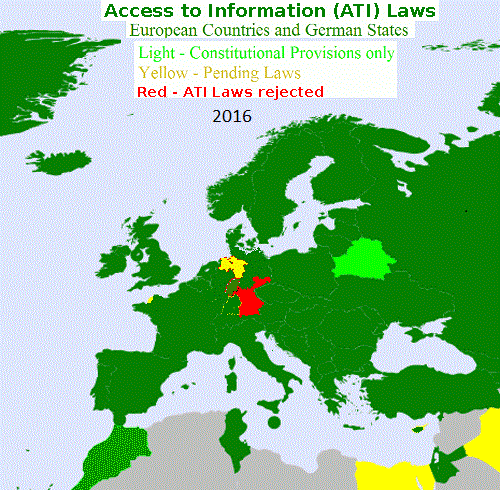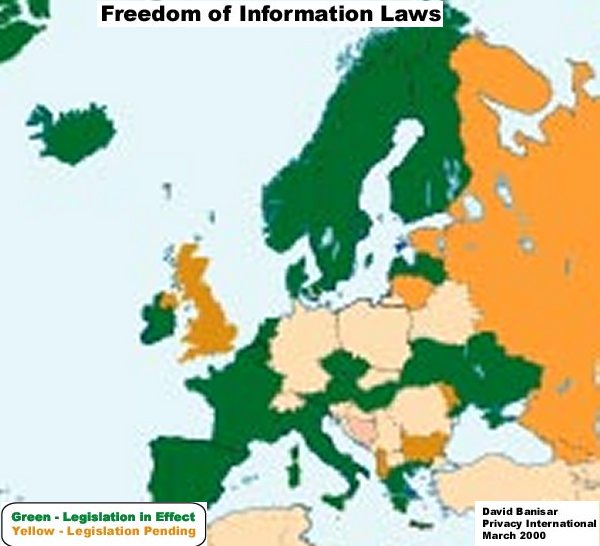
X. Baltic Sea NGO Forum, Tuesday, 24th April 2012, 11:00-12:45. PowerPoint material for 2nd session WS III Human Rights: Freedom of information:
Access to documents of public administration is a human right according
to the International Covenant on Civil and Political Rights (ICCPR) [1, 4,
5] and jurisdiction
of the European Court of Human Rights (ECtHR) [6]
on the basis of the European Convention for Human Rights (ECHR) [2]
and is seen as a precondition for democracy and important in the fight of
corruption. OSCE supports access to information [A].
UN, OSCE and AOS confirm in their Joint Declaration by the Three Special
Mandates for Protecting Freedom of Expression 6.
December 2004, that Access to Information is a human right. [3]
The "General Comment No. 34 on Article 19 of the ICCPR"
[4]
confirms that ATI is a human right in its § 18.
Germany ratified ICCPR and ECHR. According to Article 46 ECHR
Germany is bound by decisions of the ECtHR. However domestic
juridical/administrative remedies must be exhausted in order to complain
to the UN Human Rights
Committee [5] and
the European Court of Human
Rights. [6]
How did Baltic Sea states follow up the suggestions of the First Baltic Sea NGO Forum 2001?
There has been much progress. The Baltic Sea Region is a very good example. However German authorities ignored the suggestions of German NGOs and the first Baltic Sea NGO Forum. 84 states with 5.5 billion inhabitants have better ATI laws then Germany. 5 local states (lander) lack ATI laws. Therefore Germany is an exception in this positive picture.
NGO shadow reports to UN Human Rights Commission to comment the
CCPR/C/DEU/6 German state report should be written. May/June
2013 the UPR Working Group will do a Universal Periodic Review (UPR)
of Germany's report. The WS III Human Rights of the Baltic Sea NGOs
suggested to follow the UPR process and support to raise awareness of
the violation of human rights e. g. of access to information. The
support of the UPR process was included in the Final Statement X. Baltic
Sea NGO Forum. The Council of Baltic Sea States (CBSS) was urged to create
an Ombudsman for Human Rights [9].
Can ICCPR and ECHR be used to enforce
access to information in states without an ATI law?
115 states with 5.9 billion
inhabitants adopted ATI laws or secured access to information in
there constitutions. Bavaria lacks a FOI law, to access public documents
of all sectors. The report CommDH(2007)14
of the Human Rights Commissioner Thomas Hammarberg about his visit to
Germany 9. – 11. and 15. – 20. October 2006 suggests to add human rights
to the core curricula in the legal education and practical training of
lawyers/judges and educate judges and administration in human
rights. The petition II/VF.0993.15 to the
parliament in Bavaria suggests to follow the recommendation and educate
judges and administration in human rights. 3. July
2008 the parliament answered: "The petition is finished on the basis
of the statements of the government." This means the suggestions are
dismissed. Both the parliament Landtag,
the ministry of justice (Justizministerium)
and ministry of interior (Innenministerium)
refused to give access to these statements, because it was written for the
parliament. 13.
December 2011 [7] access was requested, because the human right of
access to information is recognised by more then 115
states with 5.9 billion inhabitants. These requests were rejected 23. January
2012 and 31.
January 2012 with insufficient reasons. On 14. July 2012 a complaint
to the administrative court in Munich was filed [8].
The appeal was denied 14. February 2014. Therefore a constitutional complaint 1 BvR 897/14 has been necessary and was filed 17 March 2014.
Sources:
